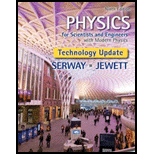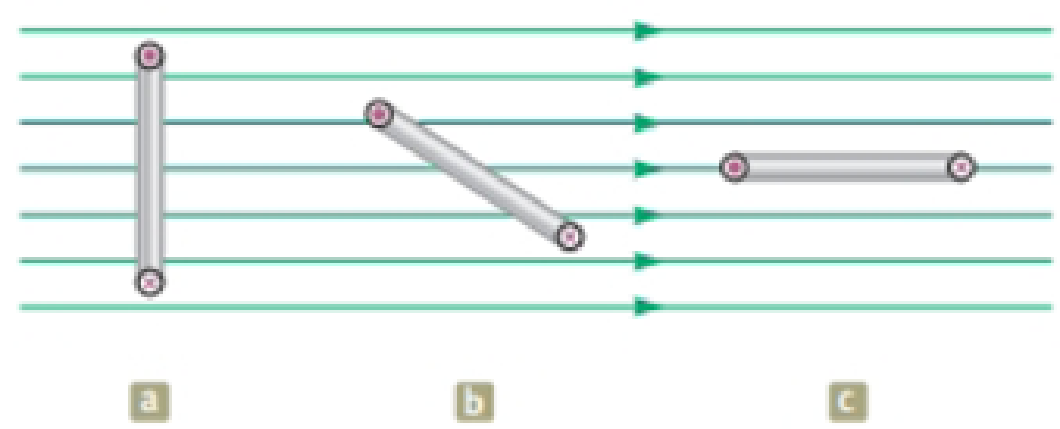
Concept explainers
(i) Rank the magnitudes of the torques acting on the rectangular loops (a), (b), and (c) shown edge-on in Figure 28.24 (page 760) from highest to lowest. All loops are identical and carry the same current. (ii) Rank the magnitudes of the net forces acting on the rectangular loops shown in Figure 28.24 from highest to lowest.
Figure 28.24 (Quick Quiz 28.4) Which current loop (seen edge-on) experiences the greatest torque, (a), (b), or (c)? Which experiences the greatest net force?

Want to see the full answer?
Check out a sample textbook solution
Chapter 29 Solutions
Physics for Scientists and Engineers with Modern Physics, Technology Update
Additional Science Textbook Solutions
Physics: Principles with Applications
Glencoe Physics: Principles and Problems, Student Edition
Conceptual Physics (12th Edition)
Sears And Zemansky's University Physics With Modern Physics
Physics for Scientists and Engineers
- Sodium ions (Na+) move at 0.851 m/s through a blood-stream in the arm of a person standing near a large magnet. The magnetic field has a strength of 0.254 T and makes an angle of 51.0 with the motion of the sodium ions. The arm contains 100 cm3 of blood with a concentration of 3.00 1020 Na+ ions per cubic centimeter. If no other ions were present in the arm, what would be the magnetic force on the arm?arrow_forwardA solenoid with an iron core is 25 cm long and is wrapped with 100 turns of wire. When the current through the solenoid is 10 A, the magnetic field inside it is 2.0 T. For this current, what is the permeability of the iron? If the current is turned off and then restored to 10 A, will the magnetic field necessarily return to 2.0 T?arrow_forwardConsider the system pictured in Figure P28.26. A 15.0-cm horizontal wire of mass 15.0 g is placed between two thin, vertical conductors, and a uniform magnetic field acts perpendicular to the page. The wire is free to move vertically without friction on the two vertical conductors. When a 5.00-A current is directed as shown in the figure, the horizontal wire moves upward at constant velocity in the presence of gravity. (a) What forces act on the horizontal wire, and (b) under what condition is the wire able to move upward at constant velocity? (c) Find the magnitude and direction of the minimum magnetic Field required to move the wire at constant speed. (d) What happens if the magnetic field exceeds this minimum value? Figure P28.26arrow_forward
- (a) At what angle (is the torque on a current loop 90.0% of maximum? (b) 50.0% of maximum? (c) 10.0% of maximum?arrow_forwardIs the magnetic field inside a toroid completely uniform? Almost uniform?arrow_forwardRank the magnitudes of the following magnetic fields from largest to smallest, noting any cases of equality. (a) the field 2 cm away from a long, straight wire carrying a current of 3 A (b) the Held at the center of a flat, compact, circular coil, 2 cm in radius, with 10 turns, carrying a current of 0.3 A (c) the field at the center of a solenoid 2 cm in radius and 200 cm long, with 1 000 turns, carrying a current of 0.3 A (d) the field at the center of a long, straight, metal bar, 2 cm in radius, carrying a current of 300 (e) a field of 1 mTarrow_forward
- A current of 1.5 A flows through the windings of a large, thin toroid with 200 turns per meter. If the toroid is filled with iron for which =3.0103 , what is the magnetic field within it?arrow_forwardA magnetic field exerts a torque on each of the current-carrying single loops of wire shown in Figure OQ29.13. The loops lie in the xy plane, each carrying the same magnitude current, and the uniform magnetic field points in the positive x direction. Rank the loops by the magnitude of the torque exerted on them by the field from largest to smallest.arrow_forwardA square loop whose sides are 6.0-cm long is made with copper wire of radius 1.0 mm. If a magnetic field perpendicular to the loop is changing at a rate of 5.0 mT/s, what is the current in the loop?arrow_forward
- Calculate the magnitude of the magnetic field at a point 25.0 cm from a long, thin conductor carrying a current of 2.00 A.arrow_forwardA wire loop with a resistance, R = 0.174 Ohms is pulled to the right out of a region with a uniform magnetic field B = 0.468 T that points out of the screen as shown in the diagram below. As is moves, out of the field region, a current is induced, because of the current, there is a magnetic force on the loop. How much force (magnitude only) is required to keep the loop moving at a constant speed of v = 17.0 m/s? The height of the loop, L = 0.189 m. Please give your answer in Newtons.arrow_forwardWhat velocity would the rod below need to move if I wanted to generate a current of 0.067 A? The magnetic field is 0.75 T everywhere in the region, R is 8 Ω, and d = 12 cm. 35.73 m/s 5.96 m/s 10.21 m/s 3.12 m/sarrow_forward
 Physics for Scientists and Engineers, Technology ...PhysicsISBN:9781305116399Author:Raymond A. Serway, John W. JewettPublisher:Cengage Learning
Physics for Scientists and Engineers, Technology ...PhysicsISBN:9781305116399Author:Raymond A. Serway, John W. JewettPublisher:Cengage Learning College PhysicsPhysicsISBN:9781285737027Author:Raymond A. Serway, Chris VuillePublisher:Cengage Learning
College PhysicsPhysicsISBN:9781285737027Author:Raymond A. Serway, Chris VuillePublisher:Cengage Learning College PhysicsPhysicsISBN:9781305952300Author:Raymond A. Serway, Chris VuillePublisher:Cengage Learning
College PhysicsPhysicsISBN:9781305952300Author:Raymond A. Serway, Chris VuillePublisher:Cengage Learning Physics for Scientists and Engineers with Modern ...PhysicsISBN:9781337553292Author:Raymond A. Serway, John W. JewettPublisher:Cengage Learning
Physics for Scientists and Engineers with Modern ...PhysicsISBN:9781337553292Author:Raymond A. Serway, John W. JewettPublisher:Cengage Learning Physics for Scientists and EngineersPhysicsISBN:9781337553278Author:Raymond A. Serway, John W. JewettPublisher:Cengage Learning
Physics for Scientists and EngineersPhysicsISBN:9781337553278Author:Raymond A. Serway, John W. JewettPublisher:Cengage Learning





